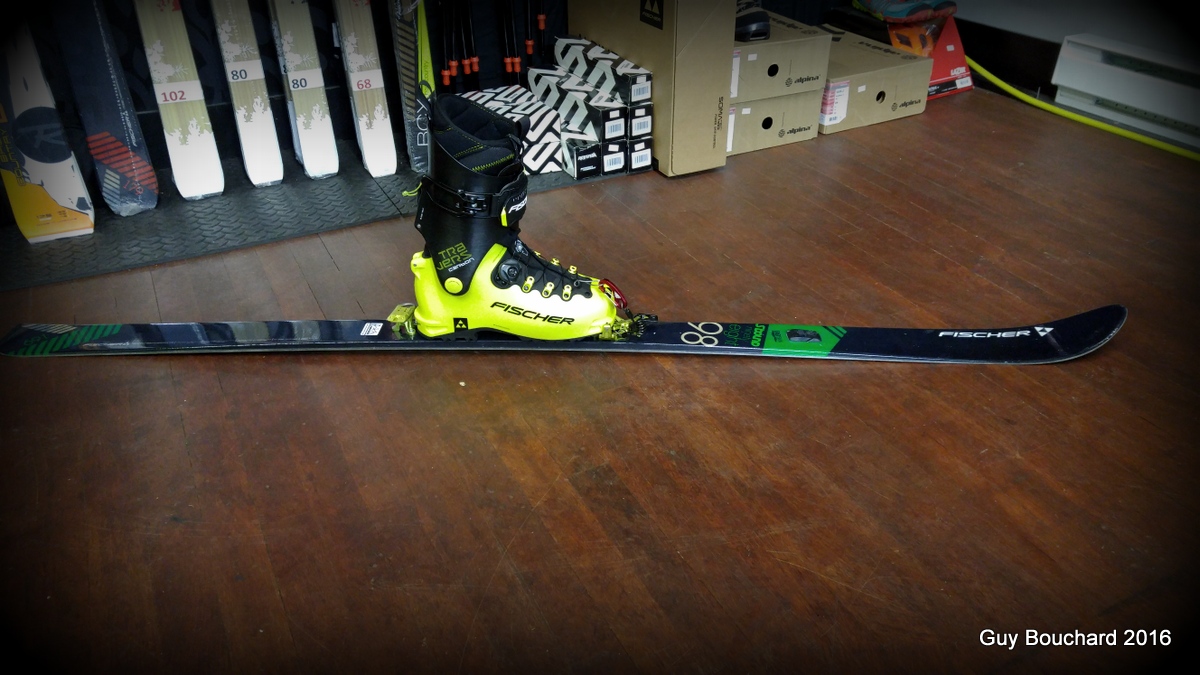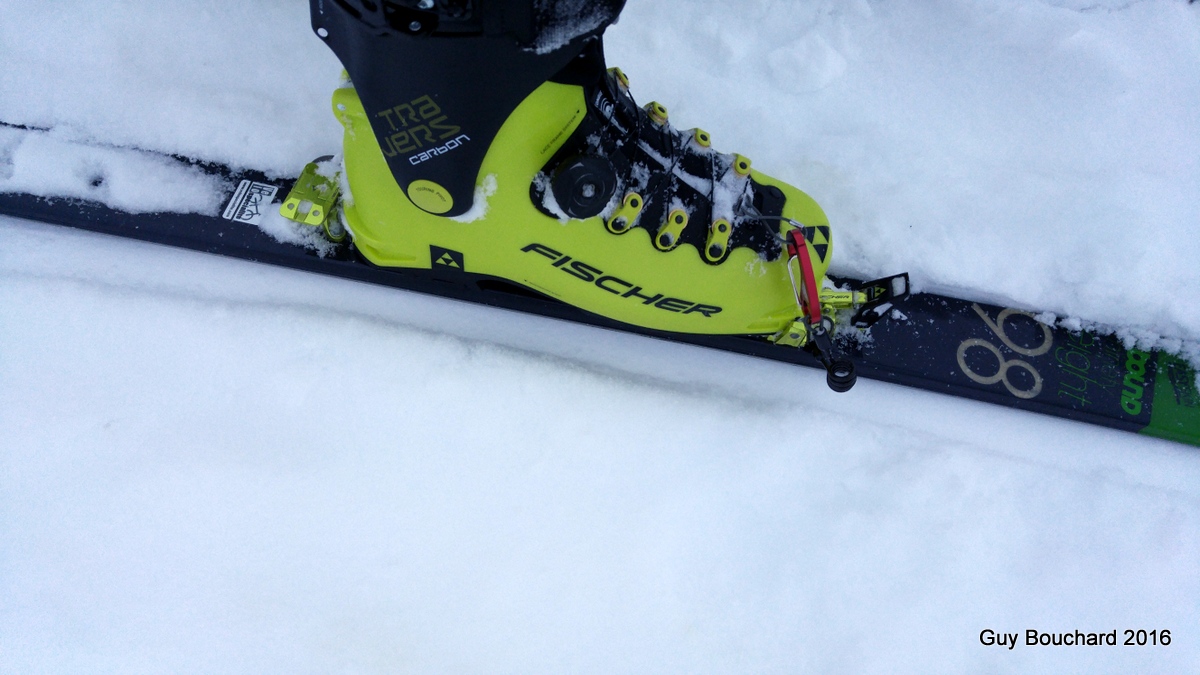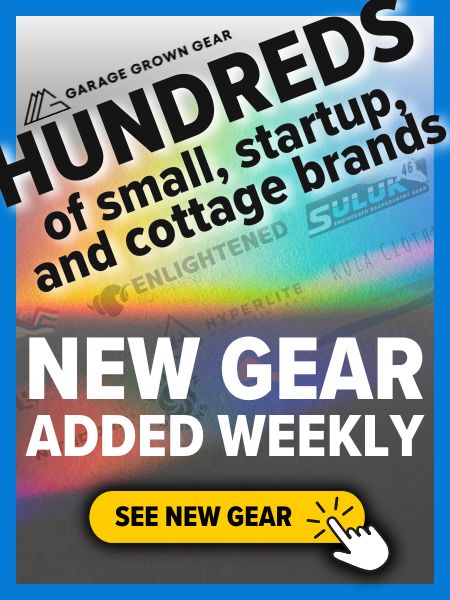Topic
AT Nordic Ski Systems: Discovering the Best of Backcountry Nordic and Alpine Touring Systems Through Hybridization
Forum Posting
A Membership is required to post in the forums. Login or become a member to post in the member forums!
Home › Forums › Campfire › Editor’s Roundtable › AT Nordic Ski Systems: Discovering the Best of Backcountry Nordic and Alpine Touring Systems Through Hybridization
- This topic has 66 replies, 3 voices, and was last updated 3 years, 11 months ago by
 Aaron.
Aaron.
-
AuthorPosts
-
Apr 8, 2014 at 10:05 am #2090917
Be careful with your assumptions, Jonathan.
Skiers with the franken-boot setup, sans heel pieces, won the Alaska Mountain Wilderness Ski Classic 4 years in a row. Out of a field of 25 racers entered into this year's Classic, there were a total of 0 wearing modern rando race boots. One may have been wearing F1s, but I'm not certain. Since there is no set route that everyone has to follow, people manage the terrain based on their skill sets.
Most Classic competitors are modifying their footwear in some way, AT or otherwise. This year's winners I believe had Solomon SNS boots with a NEOS-type super gaiter glued/riveted on. Their route included a traverse of President's Chair Glacier. The second & third place finishers wore AT mods and completed an even more direct route up the Kennecott Glacier.
You should put your rando race setup to the test and enter next year's Winter Classic. I'm sure you would compete with the usual leaders if you're willing to ski for 15+ hours/day and carry a 30 lb. pack…but even the easiest route on the Classic, especially this current Wrangell Mountains course, is not easy terrain.
Apr 8, 2014 at 10:16 am #2090920If you're skiing with Dynafit toe pieces but no heel pieces, you must indeed be skiing on very easy terrain … or else you're skiing very poorly on difficult terrain.
Personally, I would rather spend more $ and have the ability to ski well on difficult alpine terrain.
Here's what elite athletes can do on gear that weighs less than nordic touring gear:
http://jasondorais.blogspot.com/2014/03/the-la-sal-traverse.html
http://slcsherpa.blogspot.com/2014/03/the-la-sal-grand-traverse-2014.html
http://sanjuanskimountaineering.blogspot.com/2014/04/lasal-mountains-traverse.htmlAnd the non-elite version on more humble mountain ranges:
http://timefortuckerman.com/forums/showthread.php?t=15945
With only a Dynafit (or similar) toe piece, and no heel piece, descending that line to the left (i.e., just barely out of the shadows) would not be … fun:

Fortunately, spending more $ for modern alpine ski touring gear allows for a setup lighter than nordic touring gear, yet easily capable of that kind of skiing.
Apr 8, 2014 at 2:22 pm #2090978Like I said, you should give the Classic a try. How well can you skate in those skis?
Apr 8, 2014 at 2:42 pm #2090986If I were to fly further than Colorado or Utah for a ski race, I would do the PDG or Pierra Menta.
Skating on skimo race gear is of course nowhere near as good as my skate racing hear, but it works if necessary…Oct 22, 2016 at 6:39 am #3432325Old thread but since it was started, i want a setup like the one described. Money wise, i could not afford it and i know to telemark so i bought some Garmont plastic 2 buckles 75mm boot. and a biggish BC 125. It was really fun on powder but since i am a poor skier, when i got into steeper slope, i was afraid to use my tele turn and had lot of trouble. I am not a downhill skier at all. Weight was a bit too much too compared to my friend BC setup.
This year (end of 2016), as a new bike/ski shop owner, and it is still an expensive setup, i bought Fisher Travers 980g AT boot and ultralight Fisher (Dynafit) AT bindings. The boot even feel comfortable (Boa closure)! I plan to learn to downhill ski (not too steep slope) to feel comfortable on my backcountry trip.

I plan on using them with Fisher S-Bound 98 169cm even if i should be on 179cm. My friend told me i should use the 179 but i like Ryan 165 setup. I know they would float a little bit more. What do you think? Should i stay with 169 or go to 179?
Oct 30, 2016 at 9:21 am #3433467Shorter skis will turn better, longer will glide better. If you’re close to the weight break (with gear) you could go either way. If you’re using scales that will exacerbate drag if you go short. Depends on priorities.
Nov 10, 2016 at 6:19 pm #3435044Guy – how are those Fischers for walking, and how is the cuff range of motion? I have yet to see a real review of those boots, as they are new. Wondering if I should put them on my list for a few years from now when I might find some used and could afford them.
Nov 11, 2016 at 8:05 am #3435110No real life experience yet. We don’t have snow and i am still undecided on which ski to install my bindings. Today, i am leaning toward some Fisher Sbound 98 169cm. Cuff range of motion is 80 degrees. It is very good. My experience with plastic boot is minimal but they seem very comfortable when i try them in the house. They are very light (same weight as some Alpina Alaska 43 BC boots i have in the shop). The Boa is craddling my feet well. Better than buckles. How it will handle the snow and cold, i don’t know.
Can i afford them? NO!! I am lucky to get them at ski shop price. ! am back in business since April. Boots and bindings are over 1000$ for me. I decided i wanted to try and i will. I have big hope in this system. If i can be comfortable, it will be a winner for me.
I will let you know as soon as i can try them!
Nov 16, 2016 at 8:25 pm #3435958“OK, OK, OK”, as Joe Pesche would say. I’ve read the article several times and studied the photos. Having been a Nordic ski patroller in NW Pennsylvania fro 10 years I have treated guests with mildly twisted ankles and knees from using NNN bindings.
That’s why my 3 pin heavy duty Nordic bindings are mounted on Voile’ releasable bindings. These linings are on both my Atomic Tele skis and my Asnes Combat-Combi backcountry touring skis. So far no injuries even with “yard sale” tumbles in both alpine ski resorts and backwoods venues. My bindings always released when necessary. So I’d advise using the Voile’ release bindings between the ski and the “Tech binding”. Jus saying’…
P.S. my boots are Scarpa T3 and with loose buckling at the top they are very comfortable for touring.
Dec 4, 2016 at 1:29 pm #3438633I now have 2 xc ski run on my new setup. It is so light, i have not lost anything going uphill for sure. Unless i would be on groomed and very fast ski track, i don’t feel slower on the flat. Going downhill? I am not a downhill ski guy so to soon to say. I need to learn. The snowplow is easy…

 Dec 27, 2016 at 4:25 pm #3442004
Dec 27, 2016 at 4:25 pm #3442004I’m looking at a similar setup. Right now the TLT7 Expedition CR boot and the TLT7 Performance are about the same price.
Would the extra stiffness of the Performance detract from its suitability for use in an XCd (as opposed to xcD) fashion? I.e. could there be less touring comfort but better downhill performance?
I’m also wondering whether the CL liner will be warm enough vs the CR liner for multiday trips. It’s quite a bit lighter than the CR liner, but more thermomoldable.
Finally, I’m interested in running these on the widest wax double or 1.5 camber ski I can find, in a fairly long format for glide. In North America that is the Fischer E109 xtralite (82-60-70).
Does anyone know of a wider wax double or 1.5 camber ski available in Europe? The Asnes Inkstad comes to mind, but is very similar in size and 400g heavier. Definitely more durable, but my sense is the Fischers are also well built.
I’m hoping the stiffness of the boots will help turn them on downhills. Is it realistic to think the E109s will float enough in powder and handle variable downhill conditions well enough? Perhaps a race ski, the s-bound 98, or the voile objective would be a better bet? I don’t want to give up kick and glide performance, but I’d like to use the ski mostly off-track, and I’d like to be able to handle deeper powder when necessary.
I found a very light AT binding with adjustable fore and aft release values, FYI – the Kreuzspitze GT.
Mar 17, 2020 at 5:44 am #3636330Revisiting this topic, I’m interested in Ryan’s choice of boot for NNN BC: the Alpina 1550. Unfortunately, I can’t find its weight specs – but far stiffer boots for the binding system can be found, and shouldn’t these solve a few turning problems decisively? I recently bought the Rossignol BC X-10 with an official weight of 1.660g per pair (EU size 42) – roughly the same as the Dy.N.A PDG Ryan has listed for his AT Nordic setup… and very considerably cheaper. :-) They seem plenty stiff for XCD in moderate terrain, and after long consideration and research, I’ve come to the conclusion that the NNN BC binding and sole profiles (seen boot-agnostically) may well be the most stable Nordic system for people whose turns are mostly parallel.
Having formerly skied with the far softer Rossi BC X-6, I think there’s a universe of difference in terms of ankle support, and I’m sure kick and glide remains far better than with any plastic boot for AT or Tele. So up to the point where a burlier boot is actually needed due to real mountain terrain, you get a ‘flow configuration’ that requires no mode changes to anything during your tour… and mark that you probably won’t even need tele skills.
Beyond that point, I can see a slender zone of usefulness for AT Nordic in the mountains. But it’s not really a system for genuine Alpine touring in steep territory – with tough ascents and fun downhills. Why have scales and a (descent-marring) Nordic camber when you are going to skin up anyway?
My skiing biography? Almost purely Alpine, fast and steep. I have never even used my current XC track skis – much too boring a prospect to me when I’m in the mountains. And I can’t really tele with my Nordic BC skis (three models). I mention all this to stress that I’m not on a free-heel mission at all! Yet I prefer NNN BC for my mildish XCD tours in the afternoons (after spending the mornings bombing down the groomers on Alpine skis).
What I also fail to see is any element of fun in ‘attacking’ mild descents – e.g. on forest roads – with Alpine bindings. By contrast, NNN BC raises the skill bar by just enough to generate some adrenaline.
Mar 18, 2020 at 8:40 am #3636561Agreed on your assessment of mild/moderate descents with alpine setups. This is my favorite setting, and I use a pretty light setup (BC-X2 + NNN BC Magnum + Rossignol BC65). I have heavier boots (Glittertinds) that I’ll bust out for crustier conditions, but they do remove much of the ‘feel’ or connection to the snow.
We’re fortunate to have such a spectrum of choices for nordic. I really enjoy the challenge of mild/moderate descents on my lighter gear. When I was first learning, I practiced my descents on straight sections, and was able to understand what I needed to do to be safe and have fun (I applied many of the same things I learned with alpine; lower center of gravity and using my body’s physics to the greatest advantage).
I can cover lots of ground on the flats and rollers while still maintaining control and having fun. I find that waxless is great for my part of the world most of the time as long as the ski is correct for your weight. I also find the scales’ mild slowing effect on downhills to be an advantage the majority of the time.
If I’m looking for turns, I have a telemark setup with skins and molded boots that is still very lightweight overall. I have not tried the burlier hybrid/nordic systems but definitely would if I could find rentals in my area. I saw that Fischer has an integrated skin system for the middle of the ski that looks interesting. But I wonder if I’d miss the simplicity of waxless when I have to stop and install/remove them?
Mar 19, 2020 at 4:39 am #3636754Similar here, John… just a bit beefier on the NNN BC and lighter on the Telemark side.
NNN BC: Rossignol BC X-10 boots with either Fischer E99 or Salomon XADV 89 skis. The latter are far more turn-friendly and profit from the stiffer boot. I could use the Fischers with my BC X-6 boots, because nothing in the world could persuade them to turn anyway. :-) They would be a bit faster, that way. But keeping both boots is too much of a luxury, so I’m currently selling the softer BC X-6.
75mm (cable): I’m setting up 189 cm Rossignol BC 110 skis (new, but an older model) for steeper terrain. Weight-wise, I could have gone one size shorter, but I want maximum kick and glide. I’ll probably go with a Rossi BC X-12 boot, though I haven’t quite decided yet. Rossis fit me well, making them easy to order. But a plastic boot might make this ski’s niche a little broader.
(‘Real’) Alpine tours: Hired equipment
Resorts: Alpine skiing equipment
Tracks (almost never): Just the Fischer E99 (which fit the tracks). I’m selling my dedicated track skis due to lack of use.
Mar 19, 2020 at 6:23 am #3636760Update: I just ordered the Rossi boots for the telemarking setup.
Mar 22, 2020 at 3:41 am #3637178Observations on weight:
Vaulé 3-pin cable bindings: about 800 g per pair, but only 460 g when the cables are in your pack – as they are likely to be most of the time: 230 g per foot
NNN BC Magnum: around 530 g per pair: 265 g per foot
Yes, both are slightly heavier than the very lightest AT models. Call it 80 g to 115 g per foot – the imo somewhat slight weight penalty that buys you all the wonderful flow.
Rossignols stiffest Nordic touring boots:
BC X-10 for NNN BC: 1720 g per pair (official)
BC X-12 for 75 mm: 1980 g per pair (official)By comparison, Dynafit’s PDG weighs 1620 g per pair, making for an additional difference of 50 g to 180 g per foot.
So, using these examples, AT Nordic would be about 260 g lighter (per foot) than 75mm and 165 g lighter than NNN BC.
You pay for that difference in terms of reduced kick and glide, plus frequent mode changes that marr your flow. Worth it? For a racer maybe. But not for me.
Feb 15, 2021 at 5:50 pm #3699649Yo! Thanks for this idea. I fell in love with it and ran it. It’s so much fun and covers pretty much everything I ski unless it’s reallllllly steep.
I can successfully skate with this setup, glide long and far if classic xc skiing, and charge most downhills that aren’t too technical (intermediate/blues if using alpine ratings). I have only taken them down one technical route so far and had my ass handed to me so I’ll keep working up to the steeper/more technical stuff.
but ya, for anything I’d usually xc ski, or messing around on fire lanes and hiking trails, this setup is incredible! Also incredible at the groomed tracks!! Looking forward to doing some longer/overnight tours on it.
The setup:
madshus epoch, 185
dynafit TLT speed lite 2.0
arcteryx pro cline carbon ($250 on sale…they were flawed but I salvaged them)
-
AuthorPosts
- You must be logged in to reply to this topic.
Forum Posting
A Membership is required to post in the forums. Login or become a member to post in the member forums!
Our Community Posts are Moderated
Backpacking Light community posts are moderated and here to foster helpful and positive discussions about lightweight backpacking. Please be mindful of our values and boundaries and review our Community Guidelines prior to posting.
Get the Newsletter
Gear Research & Discovery Tools
- Browse our curated Gear Shop
- See the latest Gear Deals and Sales
- Our Recommendations
- Search for Gear on Sale with the Gear Finder
- Used Gear Swap
- Member Gear Reviews and BPL Gear Review Articles
- Browse by Gear Type or Brand.







